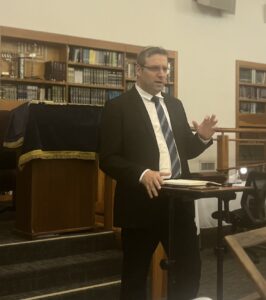By Jacob Kamaras
LA JOLLA, California — Planned before the onset of the war in Israel, a lecture by Rabbi Yoni Rosensweig, a leading expert on the intersection of mental health and halacha (Jewish law), gained extra relevance on Monday night at Congregation Adat Yeshurun of La Jolla.

Rosensweig is the founder of Maaglei Nefesh – The Center for Mental Health, Community & Halacha, an Israel-based organization whose stated vision is “a society that actively supports people on their journey to positive mental health.”
Today, the mental health of Israel’s soldiers should not be ignored, according to Rosensweig.
“When we talk about the battle-readiness of an individual…is a person prepared for what they’re about to embark on, what they’re about to do. Are they ready to go into battle? Are they ready to say, ‘OK, I’ve said my goodbyes, I’ve talked to everyone I need to talk to.’ Are they ready, or do they have open issues?” Rosensweig said, adding, “Putting a person’s mind at ease could many times go a long way toward making sure they’re safe, they’re healthy…For a person to be ‘on,’ they need all the strength that they can get.”
He noted that in its halachic-related guidelines for the current war, the IDF’s rabbinate allowed soldiers to violate the laws of Shabbat to travel to see their families if Shabbat is the only time they can get off from military duty. The ruling, he said, was made with the understanding that “every little thing counts. A person’s mental state will affect their ability to perform.”
At the same time, ruling on questions of halacha and mental health is also not about producing lenient opinions.
“If I tell a person that they do not need to fast on Yom Kippur because of anorexia, do you think they feel good about that psak (ruling) or bad?” Rosensweig asked. “You’re telling them, ‘You’re not normal, you’re not regular, you’re not like everyone else who’s fasting.’ A person who suffers from mental health challenges is already feeling that way. It’s what we call stigma.”
He continued, “Halacha should not make you feel that way. I’m not trying to deepen people’s problems. I’m trying to solve them. If by giving a leniency I’m causing stigma, then that’s a problem. We can’t switch one problem for another problem. We need to find a balance for the individual, so that they can have both — so that they can keep halacha, feel like a good Jew, feel that they’re part of the system, but at the same time care for their mental health.”
Rosensweig reflected that his job during a time of crisis “is very minimal” because traumatized individuals such as the victims of the October 7 Hamas attacks need the help of mental health professionals. At the same time, community leaders like rabbis play a role in decreasing stigma.
“I’m not in the hospitals, I’m in the community. I’m a community rabbi. If a person with a disorder is going to live a normal life, they’re going to live it in the community” and not in the hospital ward, he said.
“We are the ones who normalize the reality of someone with a disability,” said Rosensweig. “We need to understand what it means within our communities to accept people with mental health conditions…We all have what to contribute. Don’t put it all on the mental health professionals. They see their patients once a week, twice a week. We see them all the time.”
For more information about Maaglei Nefesh, visit: https://mnefesh.org/
*
Jacob Kamaras is editor and publisher of San Diego Jewish World.